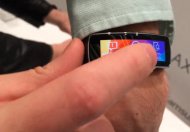The World Economic Forum has compiled a list of the most potentially influential technologies currently being developed which also includes mining metals from the desalination of sea water and super-light cars made using carbon-fibre elements.
Each innovation was selected for its capacity to have a real and positive impact on the world, according to the WEC’s Global Agenda Council on Emerging Technologies which made its selections with the help of leading figures from industry and academia.
Topping the list is “brain-computer interfaces” which would build on the already available technology which allows people to type by monitoring their electrical activity in their brain.
The technology could make it possible for people with disabilities to operate wheelchairs and other equipment using their thoughts, according to the council.
In its report the council stated: “Technology has become perhaps the greatest agent of change in the modern world. While never without risk, positive technological breakthroughs promise innovative solutions to the most pressing global challenges of our time, from resource scarcity to global environmental change.
“However, due to a lack of appropriate investment, outdated regulatory frameworks and gaps in public understanding, many promising technologies are constrained from achieving their potential.”
According to the report there is hope for arid countries which see very little rainfall as the mining of metals from waste water or brine is making large-scale desalination financially viable for the first time, while the drive to cut carbon emissions could be boosted by cars built with carbon-fibre reinforced parts making them up to 40 per cent lighter and stronger than older models, offering huge energy savings.
Cleaner energy will benefit from advances in grid-scale electricity storage which would allow surplus energy from fluctuating renewable sources such as sun and wind to be stored until it is needed while new batteries based on silicon could hold up to three times more power than existing products.
New wearable electronics, which are already available in the form of the Google Glass and Fitbit wristband, could offer health benefits by tracking heart rates and stress levels while new cancer treatments are being by harnessing the power of microbes which occur naturally in the human body.
Other medical research is focusing on drugs based on proteins which regulate human genes which could be used to fight cancer and infectious diseases.










